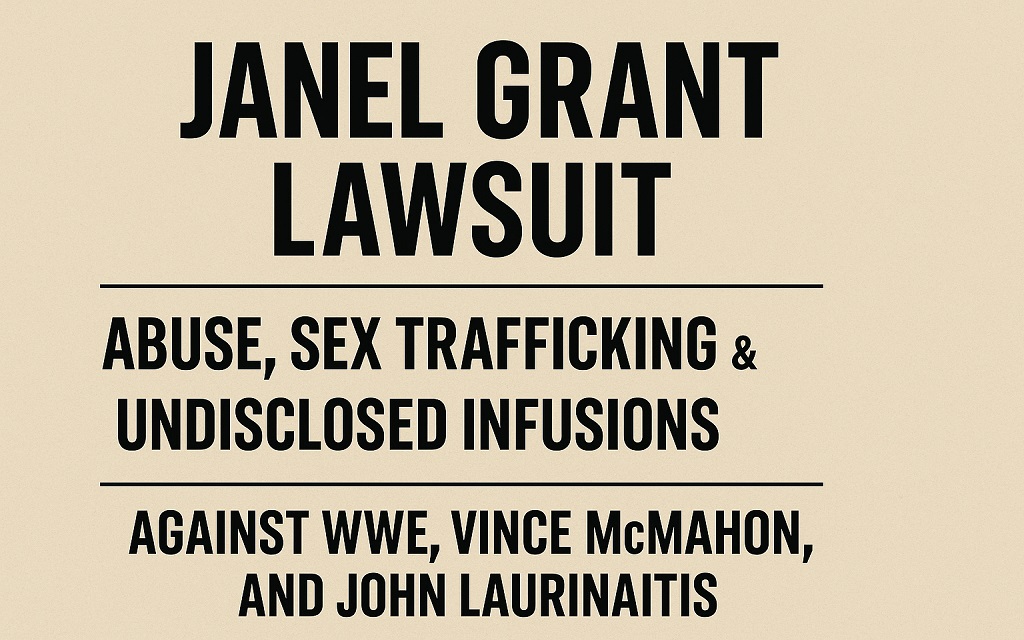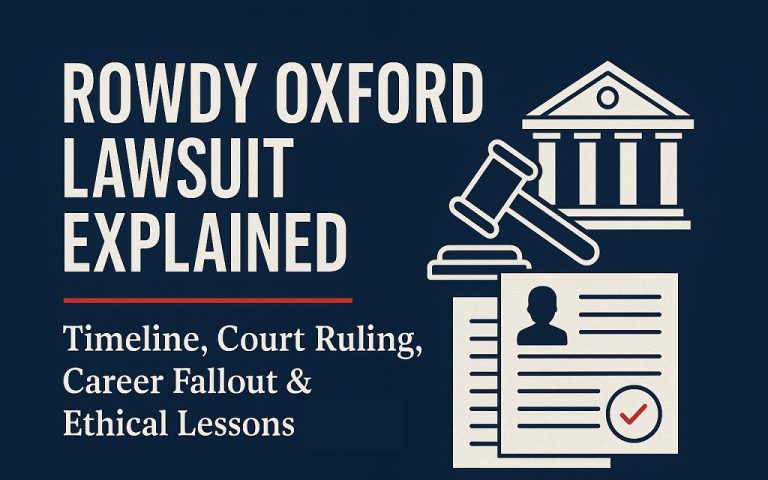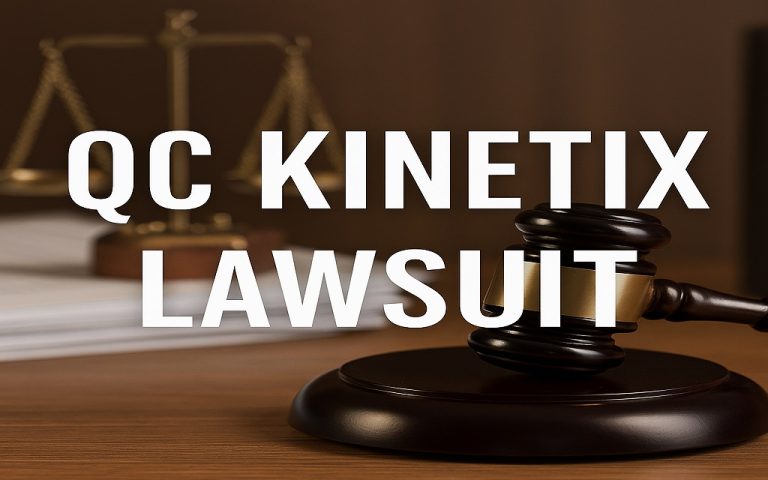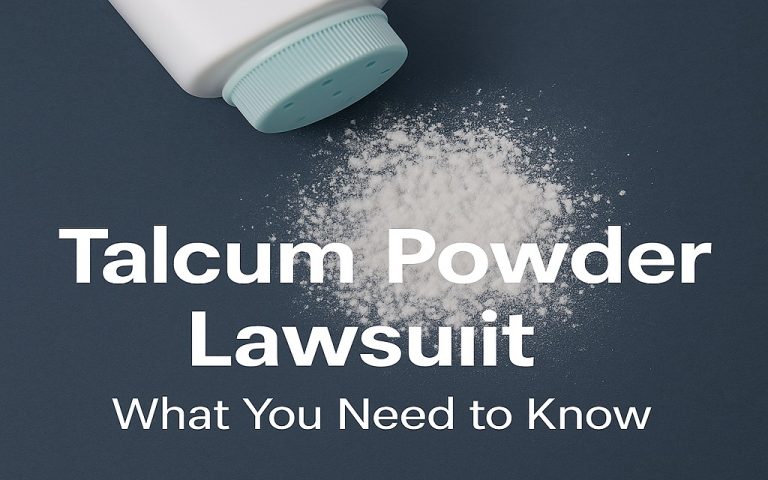The Janel Grant lawsuit has ignited a legal firestorm in the world of professional wrestling. At the heart of the case are grave allegations against WWE’s former chairman, Vince McMahon, former executive John Laurinaitis, and medical professional Dr. Carlon Colker. Grant’s lawsuit includes claims of sex trafficking, physical abuse, and undisclosed medical treatments — painting a disturbing picture of power abuse, coercion, and medical malpractice within a multibillion-dollar organization.
This article breaks down the full legal timeline, parties involved, court developments, and broader implications for WWE and corporate accountability.
Chronology of Legal Actions
January 2024: Lawsuit Filed in Federal Court
On January 25, 2024, Janel Grant initiated a lawsuit in the U.S. District Court for the District of Connecticut. John Laurinaitis, Vince McMahon, and WWE are among the defendants. Grant claims that McMahon exploited her financial problems and unemployment as leverage to force her into a sexual connection by making false claims of emotional support and job progress when she took on the role of carer for her parents. Grant asserts further that McMahon escalated to abusive behavior, including sexual assault alongside Laurinaitis in 2021, and shared explicit photos of her to entice other WWE talent.
June 2024: Federal Stay and Pre‑Action Discovery in State Court
A six-month stay on the federal case was implemented in late May 2024 at the request of the Department of Justice to accommodate a parallel federal investigation by the Southern District of New York dealing with alleged sex trafficking by McMahon.
Meanwhile, in July 2024, Grant filed a pre‑action discovery petition in the Connecticut Superior Court against Dr. Carlon Colker and Peak Wellness Clinic. She aims to obtain medical records, bills, communications, and testimony related to her over 60 visits to the clinic—allegedly directed by McMahon—to assess potential civil claims including fraud, RICO conspiracy, assault, battery, civil conspiracy, and aiding and abetting.
August 2024: Colker Responds With Defamation Lawsuit
On August 6, 2024, Dr. Colker filed a federal defamation suit targeting Grant’s attorney, Ann Callis, and Peak Wellness. He asserts that no mystery substances were administered, no IV infusions occurred, and that Grant signed informed consent forms and ended treatment voluntarily in April 2022.
May 2025: State Court Ruling Clears Path for Discovery
On May 12, 2025, Connecticut Superior Court Judge Colleen Zingaro denied Dr. Colker’s motion to dismiss Grant’s petition. The ruling authorizes expanded discovery, including the compelling of medical records, correspondence with McMahon, and the potential deposition of Colker—all while separate from the federal case and Colker’s defamation suit. A concurrent federal development saw former co-defendant John Laurinaitis settle confidentially and agree to cooperate with Grant’s legal team, hinting at insider testimony against McMahon.
Timeline of Key Events
| Date | Event |
|---|---|
| January 25, 2024 | Janel Grant files her original complaint in U.S. District Court for the District of Connecticut, alleging sexual assault, sex trafficking, coercion, and an invalid NDA against Vince McMahon, John Laurinaitis and WWE. |
| Early 2025 (Jan) | Grant’s legal team indicates an amended complaint will include additional defendants and more detailed allegations. |
| January 31, 2025 | Grant formally files an amended complaint (adding new defendants such as Brock Lesnar and naming additional allegations). |
| May 7, 2025 | A federal judge (Sarah F. Russell) accepts the amended complaint. At the same time the court delays full discovery, but allows limited “motion-related” discovery tied to arbitration issues. |
| May 28, 2025 | Former defendant John Laurinaitis reaches a settlement with Grant and agrees to cooperate (i.e., provide evidence) while being removed as a defendant. |
| June 30, 2025 | WWE and Vince McMahon formally oppose Grant’s motion for new evidence/discovery ahead of possible arbitration. They argue she fails to meet the relevant standard for pre-arbitration discovery. |
Key Allegations in the Janel Grant Lawsuit
1. Sex Trafficking and Coerced Relationship
According to Grant, McMahon lured her in by promising her a job and forcing her to engage in sexual actions, such as arranging meetings with Laurinaitis and other WWE stars. Additionally, according to the Trafficking Victims Protection Act (TVPA), she describes these incidents as trafficking, mentioning denial of autonomy, implied threats, and recruitment through exploitation.
According to her lawsuit, she was subjected to many assaults, including a threesome in May 2020 with McMahon and a friend, and another in June 2021 in which McMahon and Laurinaitis cornered her and pushed themselves on her against her requests. Moreover, she contends McMahon shared explicit media of her with high-profile WWE talent to influence contract decisions.
2. Emotional and Physical Abuse
Grant outlines ongoing emotional manipulation, physical intimidation, and threats to force compliance. She describes being monitored, isolated from external connections, and punished when resisting McMahon’s demands. Her complaint paints a portrait of persistent “psychological coercion and exploitation” rooted in workplace hierarchy.
3. Undisclosed Medical Treatments at Peak Wellness
Grant visited Peak Wellness over 60 times from 2019 to 2022, allegedly at McMahon’s direction, receiving undisclosed pills and intravenous infusions. She claims McMahon financed these treatments, which came without informed consent or transparency, resulting in emotional and physical side effects.
Dr. Colker denies all allegations, saying the treatments were voluntary, labeled, and medically routine. Colker emphasizes that no injections were administered and no adverse side effects were reported.
Defendants’ Responses & Counteractions
WWE, McMahon & Laurinaitis Denials
WWE and McMahon have made repeated public denials, characterizing the claims as “malicious” fabrications intended for attention. They have filed motions to dismiss and petitions to compel arbitration, citing nondisclosure agreements (NDAs) allegedly signed by Grant in 2022. McMahon contends their relationship was consensual and defends the NDA’s enforceability under the Speak Out Act and TVPA
Laurinaitis’ legal team has also denied any abuse, later filing their statement claiming he, too, was controlled by McMahon. In May 2025, he was removed as a defendant and agreed to cooperate, potentially as a witness.
Dr. Colker’s Defamation Action
Dr. Colker’s lawsuit targets Grant’s legal team, asserting that she propagated false statements for publicity. He claims all medical procedures were transparent, periodic, and accompanied by signed consents. No drugs were administered without disclosure, and no harmful aftereffects were reported. He accuses Grant of smear tactics and seeks damages for defamation, business interference, and emotional distress.
Current Status
The lawsuit is ongoing. The amended complaint stands and the case has not yet moved into full discovery for most matters.
The primary procedural battleground now: whether the case will proceed in court or be forced into arbitration, pursuant to the NDA’s arbitration clause. WWE/McMahon are pressing to compel arbitration. Grant is resisting that and seeking to use discovery to challenge the enforceability of that clause.
Some discovery is allowed, specifically “motion-related” discovery tied to arbitration issues, but full discovery is delayed.
With Laurinaitis removed as a defendant and cooperating, Grant’s legal team may benefit from additional evidence against McMahon/WWE.
No public trial date appears to be set yet. The arbitration motion and discovery process will likely determine the next major step.
Legal Jurisdiction and Court Strategy
Federal and State Court Dynamics
Grant initiated a federal suit under the TVPA and Speak Out Act (42 U.S.C. § 19401 et seq.), which invalidates NDAs in sexual misconduct cases. The federal case was stayed for six months in mid‑2024 due to an overlapping criminal inquiry by the DOJ.
In parallel, the Connecticut pre-suit discovery petition allows Grant to gather critical evidence—medical records, communication logs, and testimony—before potentially filing a lawsuit in state court.
Read Must: What Happened in the Flo Rida Lawsuit?
Strategic Motions: Arbitration vs Discovery
WWE’s push to shift the suit to arbitration uses the 2022 NDA. Grant challenges this, citing the Speak Out Act and TVPA to render the NDA void in cases involving sexual abuse and trafficking.
Judge Zingaro’s recent ruling disregards arguments that the discovery petition is moot or improperly verified, emphasizing that evidence might support claims unrelated to the federal case.
If discovery exposes ambiguous medical consent or corroborates trafficking claims, the case could shift from procedural battles to a full civil trial.
Media Coverage and Public Reactions
Major outlets such as CBS, NBC, WSJ, and Law360 have reported on the Janel Grant lawsuit, highlighting abuse and trafficking allegations and questioning corporate accountability.
Grant’s legal team aims to void restrictive NDAs and pave the way for other victims to come forward. They emphasize transparency amid broader #MeToo and legal movements.
Mixed Public Response
Public reaction is divided. Some support Grant and call for systemic change, while others question her timing, the level of detail, and her motives. McMahon’s defenders argue that there is a lack of solid evidence.
Laurinaitis’ cooperation, though speculated, could significantly shift public perception if he provides testimony.
Broader Implications
WWE and Corporate Accountability
Confirmation of trafficking or unethical medical practices may force WWE and other entertainment entities to overhaul HR protocols, especially concerning talent relations and medical oversight.
Medical Ethics & Consent Standards
The case highlights critical failures in informed consent and record transparency. Dr. Colker’s situation could trigger license reviews and clarify liability boundaries in workplace medical treatments.
TVPA and the Entertainment Industry
Grant’s use of the TVPA in an entertainment-employment context is rare. A successful precedent could extend trafficking law to include emotional and sexual coercion within salary-based roles.
NDAs and Legal Reform
Challenging NDAs in high-profile abuse cases increases momentum for transparency. So, it reflects recent legal reforms to limit NDAs in sexual wrongdoing.
Next Developments to Watch
- New amended complaint: Expect updated allegations as Grant supplements her case with discovery findings, including full naming of WWE figures
- Discovery disclosures: Medical records and communications may emerge in late 2025.
- Arbitration decision: A Federal judge will determine whether the 2022 NDA mandates arbitration.
- DOJ criminal probe: The outcome may influence a civil case, particularly regarding TVPA applicability.
FAQs
What legal statutes does Grant rely on?
She cites the Trafficking Victims Protection Act, Speak Out Act (invalidating NDAs in abuse cases), and various state tort claims (e.g., battery, fraud, conspiracy)
Why was the federal lawsuit stayed?
A six-month pause (June–December 2024) was requested by the DOJ Southern District of New York, which had a criminal investigation into McMahon’s alleged trafficking.
What does the state court ruling accomplish?
Judge Zingaro’s May 2025 decision allows Grant to obtain medical and communication records from Colker and Peak Wellness under Connecticut law—a step toward discovery before formal suit filing.
How does Colker defend himself?
He maintains that all treatments were consented to, adequately documented, and medically standard. His statements deny infusions or adverse effects and accuse Grant of defamation.
What effect does Laurinaitis’ cooperation have?
His removal as defendant and agreement to cooperate suggest insider validation of Grant’s claims, potentially strengthening her legal and evidentiary position.
Conclusion
In short, the Janel Grant lawsuit is more than just a personal legal battle. It’s a potential landmark case on how power, exploitation, and healthcare intersect in the entertainment industry. As court proceedings continue, the outcomes could reshape industry norms and clarify the scope of federal trafficking laws. However, it highlights the need for stronger consent and ethical standards across corporate America.
So, stay updated as this high-stakes legal drama unfolds.
Disclaimer: This article provides a general overview of the Janel Grant Lawsuit, based on publicly available information, and is intended for informational purposes only. It is not legal advice. It does not constitute legal advice.
Musarat Bano is a content writer for JudicialOcean.com who covers lawsuits, legal news, and general legal topics. Her work focuses on research-based, informational content developed from publicly available sources and is intended to support public awareness. She does not provide legal advice or professional legal services.




